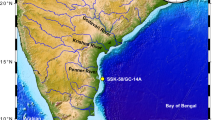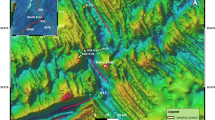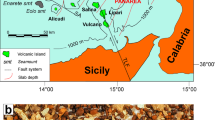Abstract
The magnetic fraction of some Cretaceous–Tertiary (K–T) boundary sediments sampled at two locations in Italy, contains a spheroidal component which has retained some relict mineral textures and, possibly, mineral chemistry from the K–T event. The spheroids contain small crystals (1–50 µm) of magnetite in a highly altered groundmass. These crystals are commonly skeletal, indicating formation by rapid growth from a high-temperature liquid. Variable concentrations of Ni, Mg and Al (differing by at least a factor of 5) in the magnetite may also reflect a relict chemistry. These spheroids contain higher concentrations of Ir and probably other siderophiles than the bulk sediment and may have been an important carrier for these elements at 65 Myr. This discovery supports evidence for a major accretionary event at the end of the Cretaceous.
This is a preview of subscription content, access via your institution
Access options
Subscribe to this journal
Receive 51 print issues and online access
$199.00 per year
only $3.90 per issue
Buy this article
- Purchase on Springer Link
- Instant access to full article PDF
Prices may be subject to local taxes which are calculated during checkout
Similar content being viewed by others
References
Montanari, A. et al. Geology 11, 668–671 (1983).
Smit, J. & Klaver, G. Nature 292, 47–49 (1981).
Epstein, S. Lunar planet. Sci. 13, 205–206 (1982).
DePaolo, D. J., Kyte, F. T., Marshall, B. D., O'Neil, J. R. & Smit, J. Earth planet. Sci. Lett. 64, 356–373 (1983).
Shaw, H. F. & Wasserburg, G. J. Earth planet. Sci. Lett. 60, 155–177 (1982).
Haggerty, S. E. Miner. Soc. Am. Short Course Not. 3, 101–300 (1976).
Bleil, U. & Smith, B. Init. Rep. DSDP Leg 51, 1407–1409 (1979).
Basaltic Volcanism Study Project (Pergamon, New York, 1981).
Alvarez, W., Alvarez, L. W., Asaro, F. & Michel, H. V. Geol. Soc. Am. Spec. Pap. B90, 305–315 (1982).
Blanchard, M. B., Brownlee, D. E., Bunch, T. E., Hodge, P. W. & Kyte, F. T. Earth planet. Sci. Lett. 46, 178–190 (1980).
Murrell, M. T., Davis, P. A. Jr, Nishiizumi, K. & Millard, H. T. Jr Geochim. cosmochim. Acta 44, 2067–2074 (1980).
Rampino, M. R. & Stothers, R. B. Nature 308, 709–712 (1984).
Whitmire, D. P. & Jackson, A. A. IV Nature 308, 713–715 (1984).
Davis, M., Hut, P. & Muller, R. A. Nature 308, 715–716 (1984).
Alvarez, W. & Muller, R. A. Nature 308, 718–720 (1984).
Author information
Authors and Affiliations
Rights and permissions
About this article
Cite this article
Smit, J., Kyte, F. Siderophile-rich magnetic spheroids from the Cretaceous–Tertiary Boundary in Umbria, Italy. Nature 310, 403–405 (1984). https://doi.org/10.1038/310403a0
Received:
Accepted:
Issue Date:
DOI: https://doi.org/10.1038/310403a0
This article is cited by
-
The occurrence of magnesioferrite-rich spinels in a trachyandesite from NE China
Mineralogy and Petrology (2009)
-
Evidence for a K/T impact event in the Pacific Ocean
Nature (1993)
-
Nanometre-size diamonds in the Cretaceous/Tertiary boundary clay of Alberta
Nature (1991)
-
A critical review of the case for, and against, extraterrestrial impact at the K/T boundary
Surveys in Geophysics (1990)
Comments
By submitting a comment you agree to abide by our Terms and Community Guidelines. If you find something abusive or that does not comply with our terms or guidelines please flag it as inappropriate.



